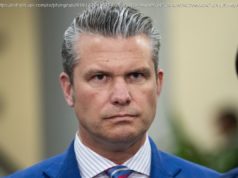Sally Yates was « headliner » at hearing on Russia interference in election, but James Clapper stole the show, pushing back on idea that he’d dismissed collusion, and reminding viewers of what Russia did.
And as a headliner she did not disappoint. In the hearing — on Russian meddling in the US election — she described her direct contacts, in calls and meetings, with the White House and White House counsel Donald McGahn, and her growing concerns about the potential that former National Security Adviser Michael Flynn could be compromised because of his undisclosed contacts with the Russians.
Calm and direct, she invoked the Constitution to argue that her concerns were pressing because they involved Vice President Michael Pence and whether he had been lied to. And she easily dispatched gotcha questions from Sens. Ted Cruz and John Cornyn.
But she did not steal the show.
That was left to James Clapper, the former director of National Intelligence. In his direct opening, and his clarifying questioning, he deployed his typical composure (along with a hint of annoyance that he was drawn out of retirement for this) to answer key questions and put to rest some lingering suspicions about the investigation.
First, Clapper made clear he was not a talking point.
For several weeks, the White House and many of its supporters have used Clapper’s statement in previous testimony – that he had seen no evidence of collusion between the Trump campaign and Russia — to argue that there, in fact, was no evidence of collusion. That original statement by Clapper, however, was tempered today with a major concession: he told the subcommittee that he did not even know of the FBI investigation that FBI Director James Comey disclosed, publicly, on March 10, into whether there was collusion to influence the election.
That’s quite a concession by Clapper, but one he wanted to make clear: essentially, he was out of the loop. He told the subcommittee that he always deferred to the FBI on whether the intelligence community ought to be notified of a law enforcement action; he also made clear under Sen. Lindsey Graham’s skeptical questioning that the FBI’s proof of collusion may not have, at that time, risen to the level for notification of the intelligence community.
But the point was clear: Clapper no longer believes he can speak authoritatively about evidence of collusion. He has taken a major defense away from the White House.
Second, in wholly unnecessary remarks obviously intended for a public audience, Clapper stated in his opening that the Russians had « also collected on certain Republican Party affiliated targets but did not release any Republican related data. » Here again, Clapper appeared to want to set the record straight: the Russians have information on the Republicans and chose not to release it.
Some have suspected that the Russians could blackmail Republicans with this information, but I would suggest the greater likelihood that Russian President Vladimir Putin wanted to harm Democratic nominee Hillary Clinton and help Republican nominee Donald Trump. Clapper said as much — he does not want us to forget that narrative.
Third, in a rather wonky legal discussion, Clapper pushed back on Republicans’ focus on whether there were politically motivated leaks about the identities of US citizens (or « unmasking ») , in this case of former National Security Adviser Michael Flynn.
Unmasking can result as part of « incidental collection » of identities during foreign surveillance of another target. Clapper explained that the request from intelligence officials for unmasking of a US citizen is « legitimate » and essential to determine motives of the foreign agent being monitored — distinct from « improper » leaking
Why is this key? For some time, the fact that Michael Flynn’s name had been « unmasked » has been used as some sort of nefarious proof that the Obama administration was unlawfully targeting him. Clapper, a long-term intelligence leader who has served both Democratic and Republican administrations, put the unmasking issue into context.
Finally, Clapper ended his statement with a reminder to the American public and the Senators of what this investigation is really about: Russia did, without doubt and with little consequence, deploy resources and tactics to disrupt America’s presidential election — to undermine Hillary Clinton, and to help Trump’s campaign. Stated without drama or emotion, it was nonetheless sobering.
Here is what he said: « The Russians used cyber operations against both political parties, including hacking into servers used by the Democratic National Committee and releasing stolen data to WikiLeaks and other media outlets. Russia also collected on certain Republican Party-affiliated targets, but did not release any Republican-related data. The Intelligence Community Assessment concluded first that President Putin directed and influenced campaign to erode the faith and confidence of the American people in our presidential election process. Second, that he did so to demean Secretary Clinton, and third, that he sought to advantage Mr. Trump. These conclusions were reached based on the richness of the information gathered and analyzed and were thoroughly vetted and then approved by the directors of the three agencies and me. »
At one stage, Clapper misspoke and used the old Cold War language and called Russia « the Soviets. » He corrected himself with a laugh (« excuse me, Freudian slip ».) . In some ways, though, it was a good reminder that the Cold War still lingers and is still being fought.
America better realize this soon.






